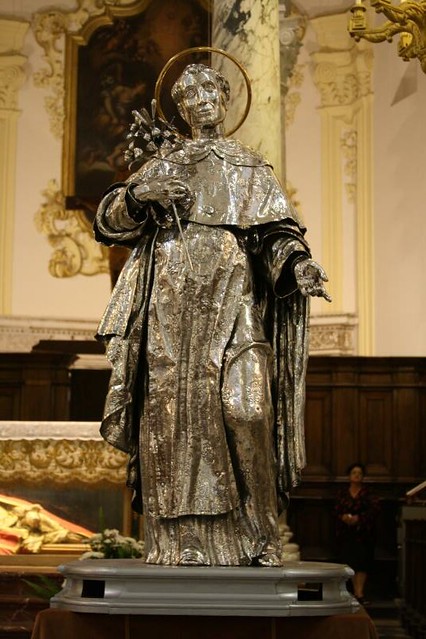Today's feast should remind us that the Saints are no shrinking violets wafting up in a continual fragrance of mystical surges. In fact they were rather hardy individuals who had to deal with a lot of issues, many of them personal issues, and fight their way through life, certainly with a smile, but most importantly with a good dose of faith, hope, charity and, in most cases, even a sense of humour which also kept them sane.
St Monica is one of those Saints who speaks to those who are looking at the hard face of life and seem they cannot move anywhere. Those in situations similar to St Monica's may well come to think that there is little hope because they come up against the impenetrable wall of another's will and desires. We all know the story of Monica and her prayer for her son Augustine: yes, she converted him, eventually, but for most of that struggle it seemed as if it would not end as well as it did. That is why Monica is a great example of the virtue of hope. She hoped in God, and she allowed that hope inspire her prayer and her efforts to bring her wayward son to God. I personally believe that the great sanctity of St Augustine is due in a large part to his mother. He is the Doctor of grace, one of the world's greatest Christians with one of the world's greatest minds, and I think his mother had a lot to do with that.
Of course Augustine was not the only one who made life difficult for Monica, long before the eldest son started on his wayward journey Monica had to content with a difficult husband and a gorgon of a mother-in-law. In Ireland we have a saying that two women should never be in the same house: if a man marries let him set up a new home with his wife, bringing her home to live with the mother might not be for the best. Well Monica should have insisted on such a solution because life with Mummy-in-law was hell. For one thing Mummy controlled the son, and she became a real invader in the marriage: as bad as he was, poor Monica could not even have her husband to herself.
However, Monica's response was that of prayer, long-suffering endurance, hope and sacrifice. Rather than resorting to bitterness and becoming difficult herself, she allowed the charity of God to triumph in her and she was able to do what many of us would think impossible: be kind and loving. It was that very kindness and love which changed hearts and she not only tamed her mother-in-law and won her husband, she converted them to Christianity. What an example for all of us. Later Monica realised that her struggle with the two at home was a preparation for an even greater one with her son, no doubt she was able to draw on what she had learned, and the outcome of the first struggle helped her keep hope alive as she engaged in the second.
Monica is not unique among the Saints, they all had to struggle and fight, but they did so knowing that God was their ally, their strength and their counsellor. They rise to the challenge calling on God to give them grace and they are generous enough to hand themselves over to him so he can guide them on the right path. The Saint is one who surrenders to God not in desperation but in love, and they reap the rewards of such trust, but not without suffering, and not without hope.
Another of the great teachers of this reality is St Therese of the Child Jesus. There is a very good article by Joe Sparks on the process of censoring Therese's writings which took place after her death - the editors wanted to show her virtues but in doing so left out a lot which they though might scandalise or frighten readers, but in reality they left out the bits which revealed the reality of Therese's struggle, those sufferings which make her truly great. I would recommend you read it. As you know I love Therese, not just because she is my sister in the Order, but also because she speaks to modern men and women about the reality of living our Christian faith in the midst of difficult times, comfortable Christianity, serious personal issues and human intrigue. Therese, for example, is one who can speak to a world immersed in atheism, where hope is gone because many have decided or felt that there is no God and they must face the harsh winds of life alone. Therese is also the Saint for the broken and the lost. One of her great devotees was Edith Piaf whose life was an utter mess. Therese seems to draw the strays to herself, probably because she has a special gift of touching their hearts and reminding them that they too are children of the Eternal Father.
Life is hard and can be harsh, and even though many may think the Saints were above it standing on their pedestals, in reality there down here with the rest of us battling on. What great teachers they are, what great allies and friends. So let us dump the pious biographies and look for the real story of the Saints: not only will we be impressed but we might also realise that we too are called to become Saints.







